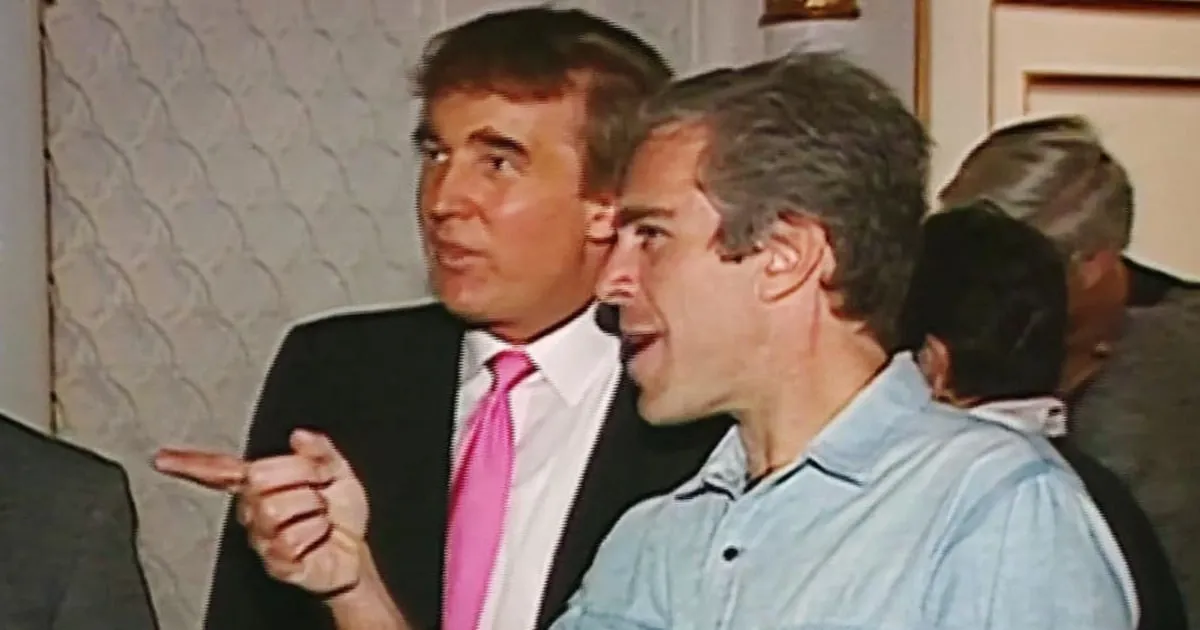
In a significant move, President Donald Trump has instructed Attorney General Pam Bondi to produce all relevant Grand Jury testimony pertaining to the Jeffrey Epstein case. However, the content of this material remains unclear, and it is uncertain whether a judge will permit its release. On Friday afternoon, the Justice Department filed a motion in federal court in New York, seeking a judge's approval to unseal the grand jury transcripts linked to Epstein and to lift any existing protective orders.
This directive from Trump came shortly after a report by The Wall Street Journal revealed that he had allegedly sent a provocative 50th birthday letter to Epstein in 2003. NBC News has not independently verified these documents, and Trump has denied sending such a letter. Following the report, Trump filed a lawsuit against the newspaper's publisher, two of its reporters, and News Corp founder Rupert Murdoch. A spokesperson for Dow Jones stated, “We have full confidence in the rigor and accuracy of our reporting and will vigorously defend against any lawsuit.”
Amid mounting pressure from his supporters to disclose more information about the Epstein case, Trump has attempted to downplay the situation. “Based on the ridiculous amount of publicity given to Jeffrey Epstein, I have asked Attorney General Pam Bondi to produce any and all pertinent Grand Jury testimony, subject to Court approval. This SCAM, perpetuated by the Democrats, should end, right now!” he stated.
Bondi responded quickly, announcing on X that the Department of Justice (DOJ) was prepared to approach the court the following day to unseal the grand jury transcripts. Legal experts cautioned that such a move could raise legal and ethical concerns, as laws protect the secrecy of grand jury proceedings. The DOJ, however, asserted that the release of these materials is warranted due to the longstanding public interest surrounding the Epstein case. The DOJ has yet to respond to requests for further comment, and the White House has directed inquiries to Trump’s posts on Truth Social.
The DOJ's motion was filed in the Manhattan federal court, where the grand jury that indicted Epstein was convened. Epstein was found dead in his jail cell in 2019 while awaiting trial for sex trafficking charges, with a medical examiner ruling his death a suicide. Although Trump has instructed the DOJ to seek the unsealing of relevant information, the filing requests the release of virtually all underlying grand jury transcripts in the case of United States v. Epstein, with necessary redactions for victim-related and identifying information.
Epstein was previously investigated by both federal and state authorities in Florida during the mid-2000s. He reached a controversial plea deal that allowed him to plead guilty to state solicitation charges involving a single underage victim, despite allegations involving numerous others. Federal prosecutors now claim he victimized over 1,000 individuals. Legal analysts suggest that any forthcoming hearings regarding the DOJ's filing may occur in a closed court, limiting public access to the specifics of the request.
Grand jury transcripts typically contain testimony from witnesses, victims, and law enforcement members involved in the investigation. It is anticipated that the material released will primarily focus on Epstein and his former associate, Ghislaine Maxwell. Maxwell was convicted on sex trafficking charges in Manhattan in 2021 and is currently appealing her 20-year prison sentence.
The law mandates that grand jury testimony remains confidential. Generally, individuals involved in a grand jury matter cannot disclose information, with certain exceptions, such as witnesses discussing their testimony or the government sharing information with related parties. Other exceptions pertain to foreign intelligence, national security, and foreign affairs, none of which seem applicable in this instance.
Notably, the 2nd U.S. Circuit Court of Appeals, which oversees appeals in New York’s Southern District, has established that judges possess inherent authority to disclose grand jury materials under special or exceptional circumstances. However, whether this situation qualifies as such remains uncertain. Factors for consideration include historical interest and the passage of time, particularly whether individuals involved in the case are still alive. While Epstein is deceased, Maxwell is alive and appealing her conviction to the Supreme Court.
The DOJ argues that the materials should be made public, citing intense public scrutiny surrounding the case. The filing acknowledges Maxwell's ongoing legal battle while still pressing for the release of grand jury materials due to the heightened interest in the case. However, legal experts warn that releasing grand jury information could lead to unintended consequences, potentially implicating individuals who have not committed any wrongdoing.
Critics, including former federal prosecutor Chuck Rosenberg, have described the move to release grand jury information as a “slippery slope.” He emphasized that it would be fundamentally unjust to expose names to public scrutiny without a proper forum for those individuals to defend themselves. Rosenberg also cautioned against calls for the release of unredacted investigative files, arguing that it is a poor practice to make such sensitive information publicly available.
As the situation unfolds, the public remains eager to see what, if any, new information will come to light regarding the Epstein case and the individuals connected to it.